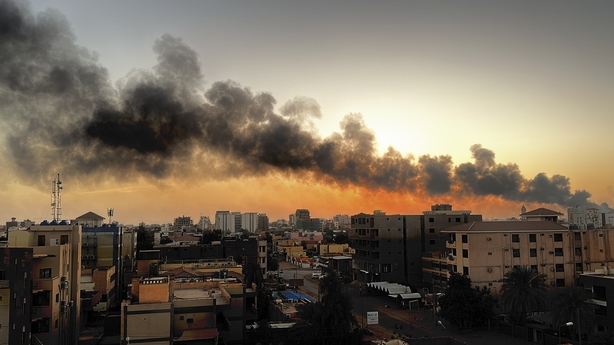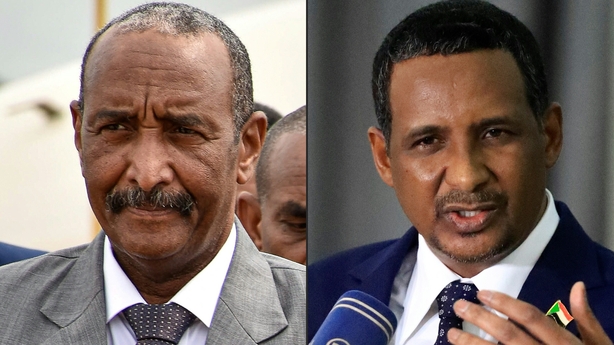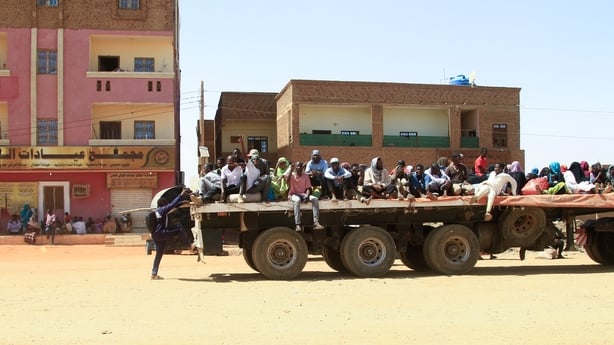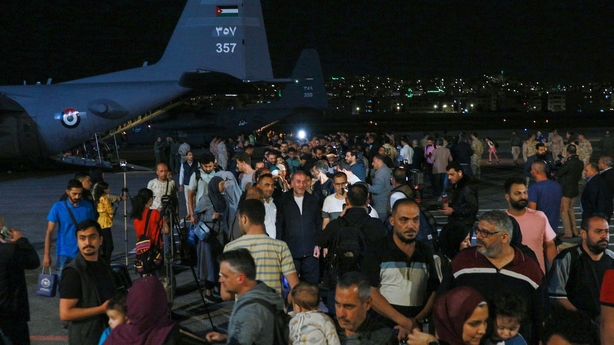Sudan has been gripped by crisis since the army overthrew long-time ruler Omar al-Bashir in 2019 after widespread protests over his nearly 30-year-rule.
For the next two years a transitional military and civilian government shared power with hopes for a path to democracy and plans for elections in 2023. But in 2021, the military half of the government ousted the civilian politicians.
Plans for returning to civilian rule were initially reached late last year, following ongoing protests since the 2021 coup. But the internationally-backed agreement was delayed as negotiating parties failed to conclude discussions on restructuring the military.
Both the Sudan Armed Forces (SAF) and the paramilitary Rapid Support Forces (RSF) would have to cede power under the plan.
The final agreement was due to be signed in early April but was postponed over disagreements on the timeline for integrating the RSF into the SAF, and timing for when the army would be formally placed under civilian oversight.
In the video below, RTÉ's news service for children, news2day, explains what is happening in Sudan:
What is happening in Sudan now?

The leaders of the Sudan Armed Forces and Rapid Support Forces have been competing for power as political factions negotiate forming a transitional civilian led government after a military coup in 2021.
But fighting erupted in mid-April after months of increasing tension between the army and paramilitaries in an escalating power struggle.
Both groups, the SAF and the RSF, have blamed each other for violence breaking out.
The SAF has accused the RSF of illegal mobilisation in the days before the conflict began, something the army viewed as a threat.
The RSF has claimed the army had tried to seize full power in a plot with Omar al-Bashir loyalists.
Who are the key players?

The conflicting forces are commanded by previously allied leaders of Sudan's ruling council.
General Abdel Fattah al-Burhan is the head of Sudan's ruling council who commands the army.
The RSF is led by the wealthy, one time militia leader General Mohamed Hamdan Dagalo, better known as Hemedti, who is General Burhan’s deputy in the council.
The disagreement is reportedly between General al-Burhan and Hemedti whose rivalries have festered.
Hemedti started out as a camel trader when he joined the Janjaweed militia group where he rose through the ranks before being recruited by Omar al-Bashir in Darfur.
The RSF was then formed under Hemedti’s leadership in 2013. Despite his links with al-Bashir and benefitting under his rule, Hemedti took part in overthrowing the president in a military coup in 2019.
With reports that Hemedti’s goal is to be given a constitutional role in the country, there are concerns both leaders will fight it out to the bitter end.
What historical factors are at play?
Since Sudan became independent of the British Empire in 1956, the military has often been in control.
There has also often been war and violent changes of leadership while citizens have little say on how the country is run.
In the era of post-dictatorship politics since 2019, the situation has still been difficult, but there have been glimmers of hope in the form of the transition to civilian rule and a chance for democracy and elections.
What challenges are people in Sudan facing?

In the first week of violence, hundreds of people were killed and thousands injured in intense fighting in the capital city Khartoum and other areas. The clashes in the capital included airstrikes and heavy weaponry as the opposing groups attack targets.
These kinds of attacks are particularly dangerous for civilians who are afraid to leave their homes. Residential areas have been turned into war zones, while water, power and food are in short supply.
Tens of thousands of Sudanese have left in the past few days for neighbouring Chad, Egypt, Ethiopia, and South Sudan, despite the uncertainty of conditions there.
Sudan is no stranger to conflict and is heavily reliant on international aid, but many humanitarian activities have been disrupted due to widespread insecurity.
The UN's World Food Programme temporarily suspended operations after a number of staff members were killed in crossfire. The World Health Organisation warned that several hospitals in Khartoum had run out of blood, transfusion equipment, intravenous fluids and other vital supplies.
What has the international response been?

Foreign countries have scrambled to evacuate embassy staff and citizens by road, air and sea from chaos-torn Sudan during hours of fragile ceasefires.
Some evacuees have been airlifted from Khartoum and taken to Djibouti, Jordan and Cyprus. Other have driven to Port Sudan and boarded ships to Saudi Arabia or headed by road to Egypt and Ethiopia.
The Irish Department of Foreign Affairs sent a team to the nearby country of Djibouti where it is being assisted by France and Spain to evacuate Irish citizens and their family members.
One Khartoum resident told Reuters he feared that with fewer international observers, fighting forces would show less respect for civilians.
What concerns are there of other forces being involved?
The Russian private military Wagner Group denied it was operating in Sudan and said it had nothing to do with battles rocking the giant impoverished African state.
Wagner mercenaries, which have in the past been deployed against insurgents in Mali and the Central African Republic, are currently spearheading attempts to capture the eastern Ukrainian city of Bakhmut.
US Secretary of State Antony Blinken said in a joint press conference with his Kenyan counterpart that the US has "deep concern over Wagner group engagement in Sudan".
Western diplomats in Khartoum said in 2022 that Russia's Wagner Group was involved in illicit gold mining in Sudan and was spreading disinformation
What are the threats to regional stability?
Sudan borders seven countries and sits between Egypt, Saudi Arabia, Ethiopia and Africa's volatile Sahel region.
The hostilities risk fanning regional tensions.
Five of Sudan's neighbours Ethiopia, Chad, Central African Republic, Libya and South Sudan have also faced political upheaval or fighting themselves in recent years.
The ongoing conflict could threaten the security of shared Nile waters and oil pipelines in the region.
The anticipation of how a new government will look, as well as a new humanitarian crisis in the making are also cause for concern.
Additional reporting Reuters







